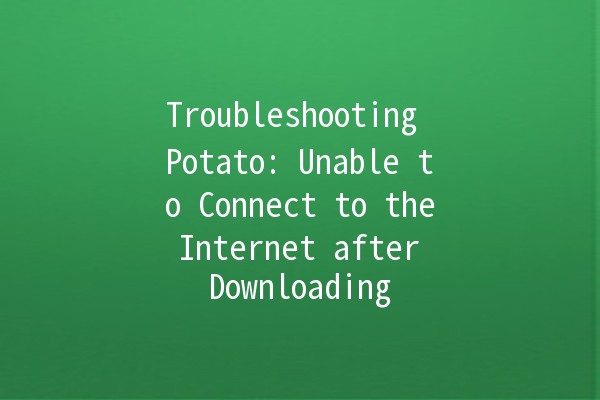Experiencing network connection issues after downloading software like Potato can be frustrating. Whether you are a casual user or a professional, not being able to connect to the internet can derail your plans. In this article, we'll explore practical approaches to troubleshoot and resolve the issue of Potato not connecting to the internet, as well as provide productivityenhancing tips to streamline your workflow. Let's dive in!
Understanding the Problem
When you download Potato, a popular multimedia application, various factors might inhibit your device's ability to connect to the internet. It could stem from network configuration issues, software conflicts, or incorrect settings. Identifying the root cause is crucial for applying the right solution.
Below, we explore potential issues and skills that could significantly enhance your ability to troubleshoot these connectivity problems.
Key Tips for Troubleshooting Connectivity Issues

Before jumping into complex fixes, it's wise to ensure that your internet connection is functioning properly.
How to Check:
Run a Speed Test: Use a service like Speedtest.net to verify your internet speed. A slow connection can hinder software performance.
Restart Your Router: Unplug your router, wait 30 seconds, and plug it back in. This often resolves connectivity issues quickly.
Try Another Device: Determine if the issue is specific to the device running Potato. If another device can connect without issues, the problem may lie with the device itself.
Sometimes, security software can mistakenly block internet access for newly installed applications.
Steps to Disable:
For Windows: Go to Control Panel > System and Security > Windows Defender Firewall > Turn Windows Defender Firewall on or off.
For Mac: Go to System Preferences > Security & Privacy > Firewall, and turn it off.
Review the settings within Potato to ensure they are correctly configured for internet access.
Key Settings to Consider:
Proxy Settings: If Potato requires specific proxy settings, incorrect configurations can disrupt connectivity.
Network Permissions: Ensure Potato is allowed to access the network in your system settings.
Running outdated versions of software can create compatibility issues that lead to connectivity problems.
Updating Steps:
Update Potato: Open Potato, navigate to ‘About’, and check for updates.
Operating System: On Windows, go to Settings > Update & Security > Windows Update. On Mac, go to System Preferences > Software Update.
When all else fails, a fresh installation can often resolve persistent issues.
Reinstallation Steps:
Improving Productivity While Troubleshooting
While resolving connectivity issues, you can also implement several productivity techniques to make the process more efficient.
Familiarizing yourself with keyboard shortcuts speeds up navigation. For instance, using `Ctrl + Shift + Esc` to open the Task Manager swiftly can help you monitor Potato’s performance without wasting time.
Documenting your troubleshooting steps can help streamline your process. Your checklists might include:
Confirming internet speed
Checking device compatibility
Verifying settings in Potato and firewall
Having a workspace devoid of distractions can significantly enhance focus. Ensure your desk is organized and free from clutter.
Engaging in communities focused on similar issues can provide fresh insights. Websites like Reddit and Stack Overflow often have users who have faced similar problems.
Instead of endlessly searching for solutions, allocate a specific amount of time for troubleshooting. Set a timer for 30 minutes to focus your efforts, after which you can take a break or switch tasks.
Common Questions about Potato Download and Network Issues
The inability to connect after installation may arise from software conflicts, misconfigured settings, or security software blocking access.
Access your firewall settings and look for application permissions. Ensure Potato has permission to connect to the internet.
If multiple applications cannot connect, the issue might be with your internet connection or network configurations rather than with Potato specifically.
Updates often contain patches for bugs, ensuring compatibility with your system and enhancing security which may include improved connectivity options.
Yes, some antivirus software may inadvertently block connections from newly installed applications to prevent potential threats.
Regular troubleshooting isn’t necessary unless you start noticing frequent connectivity issues. Reactive troubleshooting (as problems arise) is typically sufficient.
Applying These Techniques
It’s essential to remain methodical in your approach towards troubleshooting connectivity issues. Combining these techniques and the knowledge gained can help alleviate network problems with Potato. By systematically addressing each aspect, not only will you enhance your chances of resolving the issue, but you'll also improve your efficiency in future troubleshooting endeavors.
Feel free to use the outlined tips to empower your internet experience. Troubleshooting can often feel like a daunting task, but breaking it down into smaller steps, implementing productivity tips, and understanding the underlying causes can make it manageable. Good luck with resolving your Potato connectivity issues!